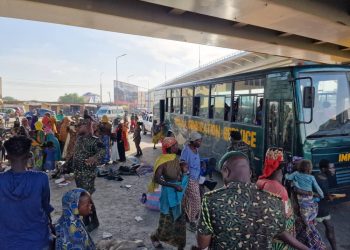Ghana Immigration officers have apprehended over a thousand street children and their guardians in a sweeping operation aimed at addressing growing concerns over child streetism, illegal residency, and national security threats in the capital, Accra
The early-morning exercise, which took place on Friday, May 16, focused on major hotspots including Kaneshie, Abossey Okai, and Kwame Nkrumah Circle—areas known for high concentrations of street beggars and child vendors.
Numerous women with children, many suspected to be foreign nationals, were seen being rounded up and escorted into immigration vehicles by uniformed officers.
Eyewitnesses reported that the operation was carried out with a combination of direct engagement and swift removal from sidewalks and intersections where the individuals typically solicit alms from motorists and pedestrians.
Operation Aims to Curb Security Threats and Child Exploitation
According to Immigration sources, the operation is part of a broader nationwide initiative aimed at decongesting urban centers, enhancing public safety, and addressing the exploitation of children. The campaign also seeks to identify and repatriate individuals residing in the country illegally, particularly those suspected of being trafficked or part of organized begging networks.
Officials indicated to Citi News Fred Duhoe that the street beggars have become a national security threat, adding that measures are being implemented to confirm the identities of those arrested and facilitate the repatriation of non-Ghanaians.
Many Ghanaians have expressed support for the initiative, describing it as timely and necessary given the visible rise in child streetism and associated social problems.
Advocates Highlight Deeper Structural Issues
Dr. Ernestina Tetteh, Convener of the Coalition for Street-Connected Children Organisation (CSCCO), recently raised concerns about the worsening state of child streetism in Ghana. Speaking on the Citi Breakfast Show on May 8, she highlighted the growing presence of children from neighboring countries such as Chad and Niger.
“Statistics are hard to come by; we only know that the numbers are growing by the day. They usually come from Chad, Niger. This has been with us since I was a child, what we used to call ‘salaka’. But the issue has become worse than before,” she said.
Dr. Tetteh also warned that some of these children may be linked to a larger, coordinated network, making it a transnational issue that requires collaborative regional solutions.

